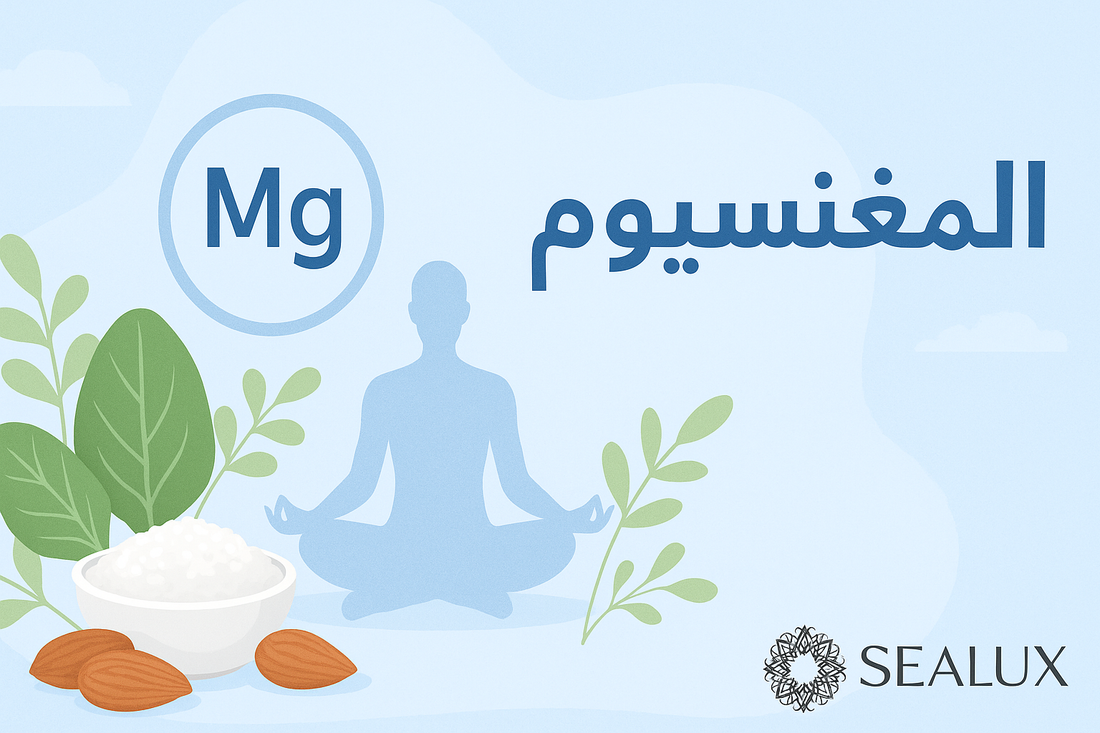
Benefits of magnesium
Share
Why is magnesium important for your health?
Magnesium isn't just a nutritional supplement or an added ingredient in a multivitamin. It's an essential mineral involved in more than 300 biochemical reactions within the body. It plays a pivotal role in energy production, regulating muscle and nerve function, maintaining blood pressure, and maintaining bone health. With a modern lifestyle increasingly reliant on processed foods, magnesium deficiency has become a common occurrence, affecting millions of people unknowingly.
In this article, we provide a comprehensive guide to the benefits of magnesium , its different types, its relationship to sleep, and its natural sources. We focus on the most prominent formulas available on the market, such as magnesium glycinate and magnesium citrate , and how to effectively address its deficiency.
Benefits of magnesium
Magnesium is a vital mineral that the body relies on to:
1- Regulating heartbeats
2- Supporting the nervous system
3- Enhancing muscle functions
4- Strengthening bones
5- Improving insulin sensitivity
6- Reducing chronic inflammation
7- Contributing to improving mood and combating depression.
Studies show that getting adequate amounts of magnesium is associated with a lower risk of heart disease, type 2 diabetes, osteoporosis, and migraines.
magnesium deficiency
What are the symptoms of magnesium deficiency?
Magnesium deficiency may not be obvious in the early stages, but it gradually develops and leads to symptoms including:
1- Frequent muscle spasms
2- General weakness and chronic fatigue
3- Sleep problems
4- Numbness and tingling in the extremities
5- Persistent headache
6- Mood swings and depression
Who is most at risk for magnesium deficiency?
1- Diabetic patients
2- People who suffer from digestive system problems (such as irritable bowel syndrome or Crohn's)
3- Those who take diuretics or heart medications.
4- Those who follow a diet low in vegetables and whole grains
Magnesium for sleep
Scientific evidence suggests that magnesium plays a direct role in regulating neurotransmitters like GABA, which promote relaxation and facilitate deep sleep. People with insomnia have reported significant improvements in sleep quality after taking magnesium supplements.
Magnesium glycinate , in particular, is an excellent choice for sleep support thanks to its high absorption and calming effect.
Types of magnesium
Magnesium supplements are available in a variety of forms, each with its own characteristics and uses. Here's a comparison of the most popular types:
Magnesium glycinate
1- Combination of magnesium with the amino acid glycine
2- It has excellent absorption and soothing effect.
3- Ideal for anxiety, stress, and improving sleep.
Magnesium citrate (Magnesium Citrate)
1- It has good absorption.
2- It helps support the digestive system and is used as a mild laxative.
3- Useful for those who suffer from constipation and poor nutrient absorption.
magnesium oxide
1- It contains a high percentage of elemental magnesium.
2- Its absorption is relatively low, and it is often used as an antacid.
magnesium chloride
Used topically or orally
Effective in cases of muscle tension and joint pain
Magnesium pills
Magnesium pills are a suitable option for people who don't get enough from their diet. It's best to choose a type with a highly absorbable form, such as glycinate or citrate, and stick to the daily dosage recommended by your doctor.
Studies indicate that regular magnesium intake reduces symptoms of premenstrual syndrome, migraines , and mood disorders.
Natural sources of magnesium
Where is magnesium found in food?
Fortunately, there are many natural sources of magnesium, the most important of which are:
- Nuts: almonds, cashews, walnuts
- Legumes: lentils, chickpeas, black beans
- Whole grains: oats, quinoa, brown rice
- Leafy vegetables: spinach, chard, broccoli
- dark chocolate (high cocoa content)
- Fatty fish such as sardines and mackerel
Including these foods in your diet helps prevent deficiencies and achieve the desired balance.
Topical use of magnesium
Topical magnesium products, such as Dead Sea salts , are a great option for people with poor stomach absorption or digestive issues.
Dead Sea Salt with Chamomile and Tea Tree Oil
Our featured product Dead Sea salt with chamomile and tea tree oil is an effective way to deliver magnesium to the body through the skin. Its formula combines:
- Natural magnesium from Dead Sea salts
- Chamomile oil to calm the nerves and relieve stress
- Tea tree oil to purify the skin and fight inflammation
This blend strikes a wonderful balance between therapeutic effectiveness and sensual bath pleasure. Regular use helps:
- Reduce muscle pain and cramps
- Supports deep sleep and relaxation
- Moisturize and detoxify the skin
Frequently Asked Questions About Magnesium
Can you take magnesium daily?
Yes, the recommended daily dose varies by age and gender, but generally ranges between 310–420 mg for adults. It's best to consult a physician before starting supplements.
Is magnesium safe for children and pregnant women?
In most cases, magnesium is safe when taken in the appropriate dose. Some types of magnesium, such as glycinate, are considered safe during pregnancy, but you should always check with your doctor first.
What is the best time to take a magnesium supplement?
Before bedtime is an ideal time, especially for those who suffer from insomnia or stress, as magnesium helps calm the nervous system.
Whether you're looking for a natural way to improve your sleep, boost your daily energy, or relieve stress, magnesium is a mineral worth considering. Incorporating natural sources of magnesium into your diet, or using well-absorbed supplements like magnesium glycinate and magnesium stearate , can make a huge difference in your quality of life.
And don't forget that comfort starts with a shower; try it now! Dead Sea Salt with Chamomile and Tea Tree Oil : Enjoy a unique experience that combines body care and nourishment with magnesium from its natural source.
